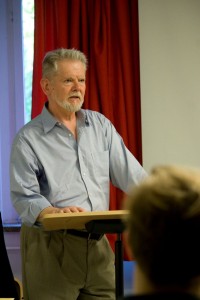In 1997 Professor Grabowicz founded Krytyka, a Ukrainian-language journal that discusses politics, history and cultural studies, amongst other things, and serves as, “the highest standard of intellectual debate” available in Ukraine.
Though this would of course be considered a respectable project in any circumstances, it became clear to us that this is a particularly important provision at a time in which, “Ukrainian public opinion is manipulated” and the country is facing an “identity crisis.”
Whilst it seemed that most of the students present had a general understanding of the political unrest the country is currently facing, few expected Mr. Grabowicz’s admission that some historians and political scientists tend to speak about Ukraine as if it were a ‘failed state’. Professor Grabowicz, with composure and gravitas, went on to open our eyes to the historical and political context of this claim.
Ukraine became independent from the Soviet Union in 1991, with a referendum resulting in a 90% vote for the ratification of its ‘Declaration of Independence’. Despite this, Mr. Grabowicz said, Ukraine had failed to make a clean break.
Indeed, there had been no revolution to accompany this move to independence, and so, despite an apparent regime change, Ukraine is now functioning under many of the same institutions and systems as it was under Soviet control. This is because the Soviet Union eliminated all the structures of Ukraine’s civil society in order that it be amalgamated, identity-less, into the whole.
And so, as in the case of Libya’s Gaddafi, whilst the Soviet Union had once, “looked permanent,” when it was in fact shaken off there was nothing left to hold everything together.
Mr. Grabowicz then spoke fairly bitterly about the fact that there had been no ‘Nuremberg’, no equivalent to the trials the Nazis faced after the Second World War. The Communists of the Soviet Union were the people responsible for, among other things, the deaths of millions due to the famine of the 30s, and yet there had been no accountability, no reparation. The Soviet party was initially outlawed after independence, but for a mere two years.
Thus it seems that Ukraine has not yet managed to fully turn its back on its Soviet past in either a practical or a symbolic sense. Contributing to this alleged lack of identity is the constant controversy concerning the status of the Russian language in the country.
Russian is already, Mr. Grabowicz said, a de facto second language, with around 80% of popular publications and almost 50% of homes operating in the language, but there is an ongoing debate as to whether it should become Ukraine’s second official language.
This duality, Mr Grabowicz conceded, has not been a problem in countries such as Belgium and Canada. In Ukraine, however, a country in which many leading politicians are reluctant to contest the amalgamation into Russian culture, this is a threat to cultural identity.
Aside from these social and cultural issues, we heard a sobering, almost dystopian description of a country in which the courts can be bribed and bought, hyper-inflation and privatization has led to growing wealth divides and oligarchic dominance, and one ECLA student attested to the fact that paying a bribe for a place at university in Ukraine is the norm.
So what can be done in order to remedy this lack of legitimate public institutions, the corruption in government, and the lack of cultural identity in Ukraine? It seemed clear to us that it is exactly projects like Professor Grabowicz’s Krytyka that are required to provide high-standard, open, intellectual debate in the Ukrainians’ own language in an effort to form the social and intellectual platforms of the future.
At the end of the lecture there were, understandably, questions as to what the international response to these issues should be. Regarding The European Football Championship Euro 2012, for which Ukraine is one of the host countries, Professor Grabowicz believes that a boycott would not be a wasted sentiment.
Indeed, he said, the Ukrainian government is desperate for recognition from Europe as a legitimate power. For this reason, to allow Ukraine to appear under the auspices of ‘business as usual’ lends credence to a regime that should not be legitimized.
One particularly insightful proposal from ECLA’s Thomas Norgaard was that the rest of Europe should react with positive, as well as negative, sanctions. He suggested reaching out to the people of Ukraine in the form of better provisions for freedom of travel and university scholarships throughout the EU. These, he claimed, are exactly the kinds of foundations upon which healthy Ukrainian institutions can be built in the future.
Whilst only a few of us here at ECLA will be able to participate in this debate, we are now far more aware of the problems that Ukraine faces and hope that Professor Grabowicz’s Krytyka can provide a basis for change.
by Zac Barnett (1st Year BA, UK)

